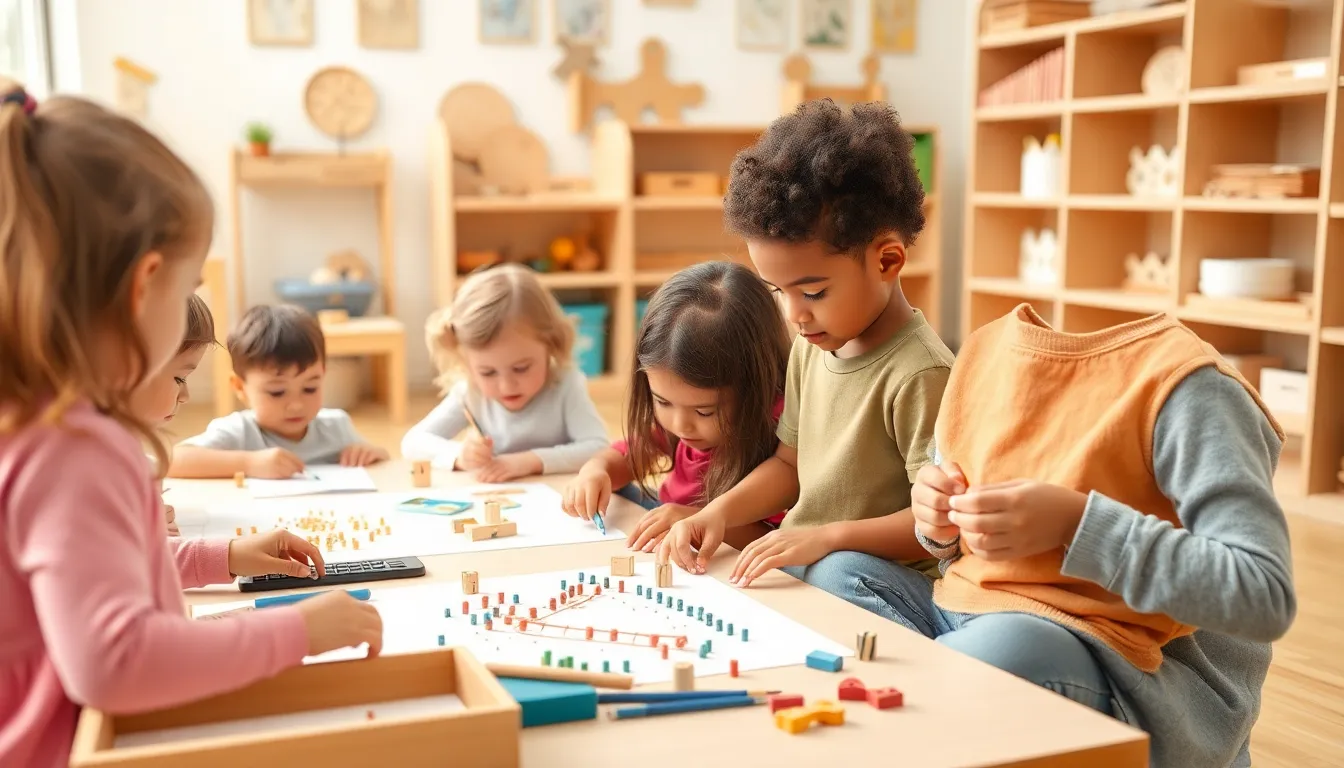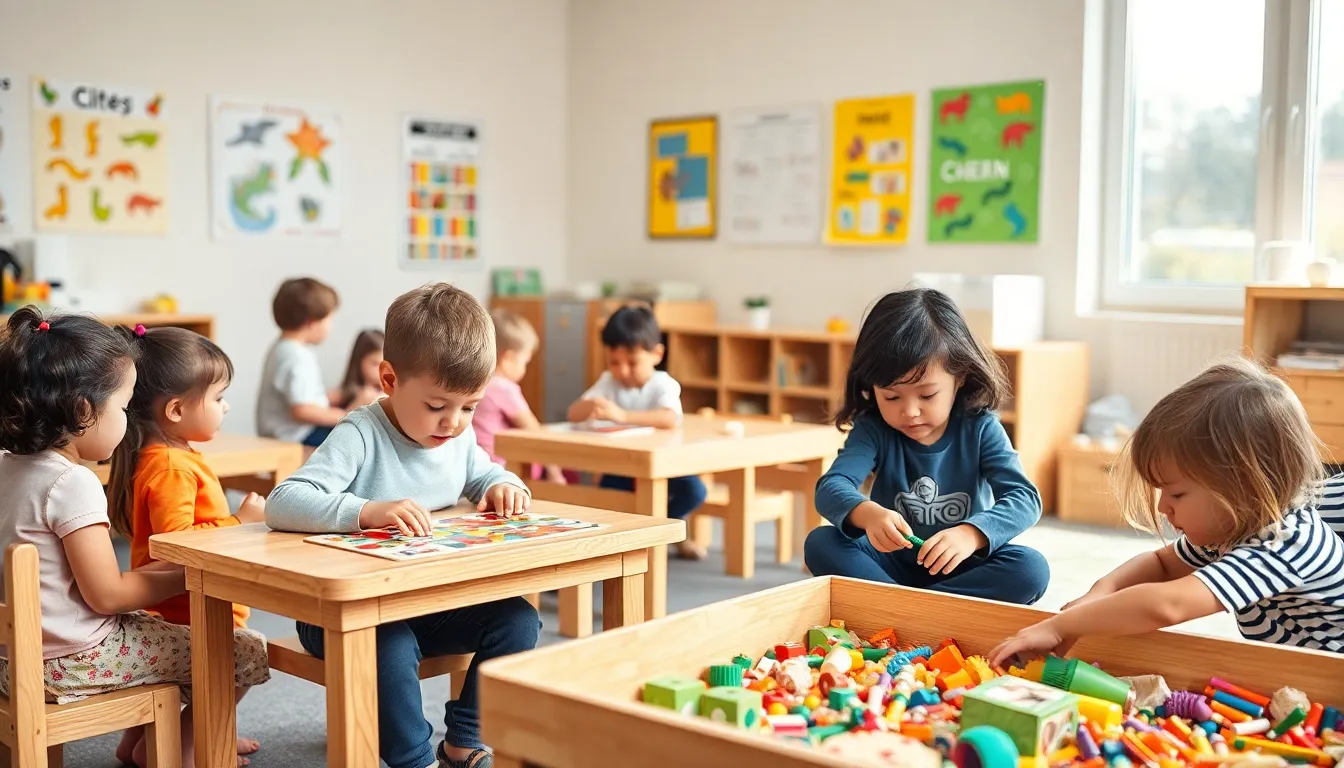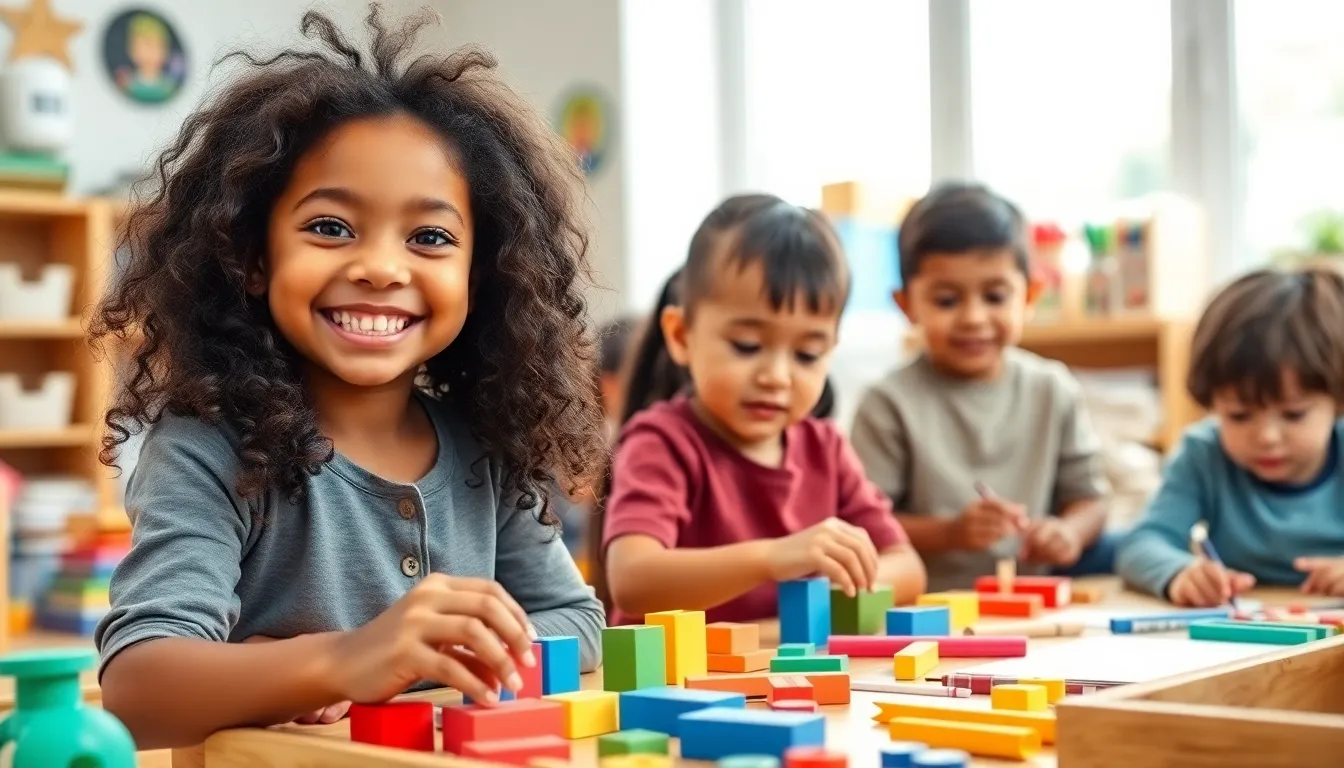Montessori kids are often recognized for their independence, creativity, and love for learning. Rooted in the educational philosophy developed by Dr. Maria Montessori, this approach emphasizes hands-on, self-directed activities that cater to a child’s natural development. In a Montessori environment, children aren’t just passive recipients of information; they actively engage with their surroundings, fostering a sense of curiosity and exploration.
The benefits of Montessori education extend beyond academics. These children develop crucial life skills such as problem-solving, collaboration, and self-discipline. As they navigate their learning paths, they cultivate a strong sense of responsibility and confidence. Understanding the principles behind Montessori education can provide valuable insights for parents and educators looking to nurture a child’s potential in today’s fast-paced world.
Table of Contents
ToggleUnderstanding Montessori Education
Montessori education prioritizes a child’s natural development and intrinsic motivation. It fosters independent learning through a structured yet flexible environment.
The Philosophy Behind Montessori Method
The Montessori method rests on the belief that children learn best through exploration and hands-on experiences. Dr. Maria Montessori emphasized respect for each child’s individuality and pace of learning. The approach encourages children to make choices, fostering critical thinking skills and self-motivation. This philosophy aligns with the objective of nurturing well-rounded individuals who thrive in both academic and social settings.
Key Principles of Montessori Learning
- Child-Centered Learning: Education revolves around the child’s interests and needs, promoting engagement and enthusiasm.
- Prepared Environment: Classrooms contain materials and resources tailored for children’s exploration and discovery, limiting distractions.
- Hands-On Activities: Learning occurs through tactile experiences, enabling children to grasp abstract concepts more readily.
- Mixed-Age Groups: Children learn collaboratively, allowing for mentorship opportunities and fostering social skills.
- Observation and Guidance: Educators observe children and facilitate learning without direct interference, ensuring that children pursue their interests.
- Freedom Within Limits: Children enjoy independence and choice within a framework of established guidelines, promoting responsibility and self-discipline.
These principles create an enriching atmosphere where children develop valuable skills essential for lifelong learning.
Benefits of Montessori for Kids


Montessori education offers numerous advantages for children, promoting a holistic development approach. This method equips children with essential skills for academic and life success.
Enhanced Independence and Self-Discipline
Montessori education fosters independence by allowing children to choose their activities, promoting decision-making and self-management. Children actively engage in self-directed tasks, leading to a greater sense of responsibility for their learning. This method encourages children to work at their own pace, enhancing self-discipline as they learn to set and achieve personal goals. For instance, a child may decide to complete a math puzzle or engage in a sensory activity, reinforcing their ability to focus and persist through challenges.
Fostering Creativity and Critical Thinking
Montessori environments stimulate creativity by providing varied materials and opportunities for exploration. Children freely explore subjects that interest them, sparking imaginative thinking and innovative problem-solving. Activities such as open-ended art projects or scientific experiments allow children to ask questions and explore multiple solutions. Additionally, mixed-age groups promote collaborative projects, where children learn to share ideas and perspectives, further strengthening their critical thinking skills. For example, older children may guide younger peers, demonstrating leadership and enhancing both age groups’ learning experiences.
Common Traits of Montessori Kids
Montessori kids exhibit unique traits that reflect the principles of the Montessori educational approach. Their development aligns with individualized learning styles and strong collaboration skills.
Characteristics in Learning Styles
Montessori kids demonstrate several distinct characteristics in their learning styles:
- Self-directed learning: They take initiative in choosing activities, showing eagerness to pursue interests without external prompts.
- Hands-on engagement: They learn best through tactile experiences, preferring to interact with materials that reinforce abstract concepts.
- Curiosity-driven exploration: They display natural curiosity, leading them to ask questions and seek answers through independent research.
- Flexible pacing: They progress at their own speed, which cultivates patience and deep understanding of subjects.
- Intrinsic motivation: They possess a strong desire to learn for personal satisfaction rather than due to external rewards or pressures.
Social Interactions and Collaboration
- Mixed-age learning: They thrive in mixed-age settings, benefiting from tutoring younger peers and learning from older ones.
- Effective communication: They express ideas clearly and listen actively, fostering respectful discussions and diverse perspectives.
- Teamwork ability: They engage in collaborative projects that enhance problem-solving and promote a sense of community.
- Conflict resolution skills: They learn to navigate disagreements through negotiation, significantly improving emotional intelligence.
- Empathy development: They demonstrate compassion and understanding towards their peers, valuing cooperation over competition.
Montessori vs Traditional Education
Montessori and traditional education embody distinct teaching philosophies that impact children’s learning experiences. Understanding these differences clarifies how each method influences developmental outcomes.
Differences in Teaching Approaches
- Child-Centered Learning: Montessori education focuses on the child’s interests and needs. Traditional education often employs a teacher-centered approach, emphasizing standardized curricula and predetermined outcomes.
- Hands-On Activities: Montessori classrooms incorporate hands-on materials that promote active learning. Traditional classrooms typically rely on lectures, worksheets, and rote memorization techniques.
- Mixed-Age Groups: Montessori environments feature mixed-age classrooms, allowing peer learning and mentorship. Traditional settings often group children by age, limiting cross-age interactions and collaborative learning.
- Flexible Pacing: Montessori allows children to progress at their own pace, fostering mastery of concepts. Traditional education generally follows a rigid timeline, potentially hindering a child’s natural learning speed.
- Role of Educators: Montessori educators act as guides, observing and facilitating learning, while traditional teachers often direct lessons and assign tasks.
Outcomes for Montessori Kids
- Enhanced Independence: Montessori kids develop strong self-management skills through decision-making and responsibility for their learning.
- Improved Critical Thinking: The exploratory nature of Montessori instills critical thinking and problem-solving abilities as children engage with diverse materials and challenges.
- Stronger Social Skills: Interaction in mixed-age settings promotes empathy, teamwork, and effective communication among Montessori children.
- Life Skills Development: Montessori education nurtures essential life skills such as collaboration, conflict resolution, and leadership, preparing children for future challenges.
- Intrinsic Motivation: By allowing children to pursue their interests, Montessori fosters a lifelong love for learning, leading to greater academic and personal success.
Conclusion
Montessori education offers a unique approach that nurtures children’s natural curiosity and fosters essential life skills. By encouraging independence and self-directed learning, it prepares children for future challenges while instilling a love for knowledge. The emphasis on hands-on experiences and collaborative learning not only enhances academic performance but also cultivates strong social skills and emotional intelligence.
As parents and educators recognize the benefits of the Montessori method, they can better support children’s growth in a world that values adaptability and creativity. Embracing these principles can lead to well-rounded individuals who are confident, responsible, and ready to thrive in any environment. Montessori kids exemplify the power of learning through exploration, making a lasting impact on their educational journeys and beyond.



